牛津译林版八下Unit1教案
八下牛津译林英语全册教案
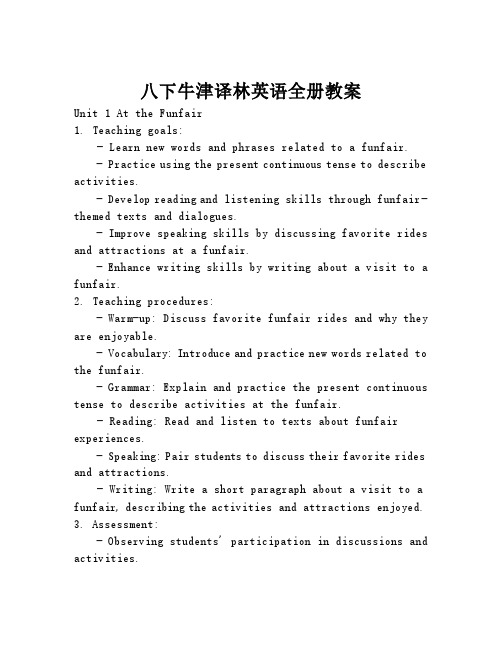
八下牛津译林英语全册教案Unit 1 At the Funfair1. Teaching goals:- Learn new words and phrases related to a funfair.- Practice using the present continuous tense to describe activities.- Develop reading and listening skills through funfair-themed texts and dialogues.- Improve speaking skills by discussing favorite rides and attractions at a funfair.- Enhance writing skills by writing about a visit to a funfair.2. Teaching procedures:- Warm-up: Discuss favorite funfair rides and why they are enjoyable.- Vocabulary: Introduce and practice new words related to the funfair.- Grammar: Explain and practice the present continuous tense to describe activities at the funfair.- Reading: Read and listen to texts about funfair experiences.- Speaking: Pair students to discuss their favorite rides and attractions.- Writing: Write a short paragraph about a visit to a funfair, describing the activities and attractions enjoyed.3. Assessment:- Observing students' participation in discussions and activities.- Reviewing written paragraphs for vocabulary use and grammatical accuracy.- Conducting quizzes to test understanding of new words and grammar concepts.4. Extension activities:- Role play: Act out a scenario where students visit a funfair together.- Creative writing: Write a story set at a funfair, incorporating vocabulary and grammar learned.- Field trip: Organize a class outing to a local funfair to experience the rides and attractions firsthand.5. Conclusion:By the end of this unit, students will have expanded their vocabulary, improved their grammar skills, and enhanced their ability to communicate about funfair experiences. The use of engaging activities and interactive learning methods will ensure a fun and rewarding educational experience for all students. Enjoy the thrill of the funfair as we explore the exciting world of amusement parks!。
牛津译林版英语8B八年级下册_Unit1_表格式教案
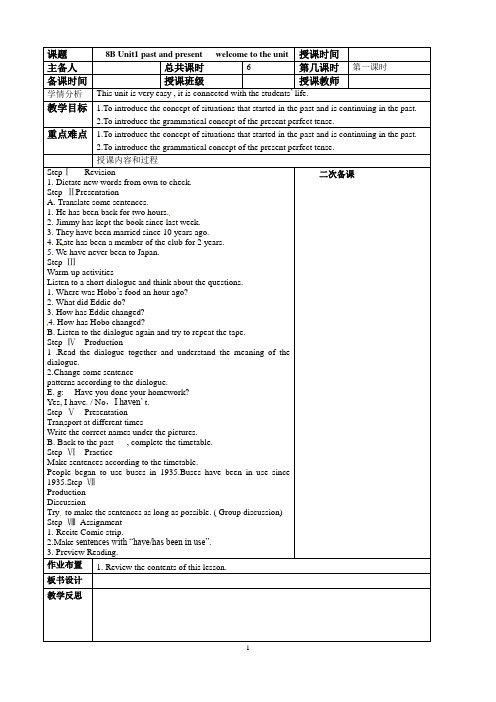
课题8B Unit1 past and present welcome to the unit 授课时间主备人总共课时 6 第几课时第一课时备课时间授课班级授课教师学情分析This unit is very easy , it is connected with the students’ life.教学目标 1.To introduce the concept of situations that started in the past and is continuing in the past.2.To introduce the grammatical concept of the present perfect tense.重点难点 1.To introduce the concept of situations that started in the past and is continuing in the past.2.To introduce the grammatical concept of the present perfect tense.授课内容和过程StepⅠRevision二次备课1. Dictate new words from own to check.Step ⅡPresentationA. Translate some sentences.1. He has been back for two hours.2. Jimmy has kept the book since last week.3. They have been married since 10 years ago.4. K ate has been a member of the club for 2 years.5. We have never been to Japan.Step ⅢWarm-up activitiesListen to a short dialogue and think about the questions.1. Where was Hobo’s food an hour ago?2. What did Eddie do?3. How has Eddie changed?4. How has Hobo changed?B. Listen to the dialogue again and try to repeat the tape.Step ⅣProduction1 .Read the dialogue together and understand the meaning of thedialogue.2.Change some sentencepatterns according to the dialogue.E. g: ---Have you done your homework?Yes, I have. / No,I haven’ t.Step ⅤPresentationTransport at different timesWrite the correct names under the pictures.B. Back to the past , complete the timetable.Step ⅥPracticeMake sentences according to the timetable.People began to use buses in 1935.Buses have been in use since1935.Step ⅦProductionDiscussionTry to make the sentences as long as possible. ( Group discussion)Step ⅧAssignment1. Recite Comic strip.2.Make sentences with “have/has been in use”.3. Preview Reading.作业布置 1. Review the contents of this lesson.板书设计教学反思课题8B Unit1 past and present Reading 1授课时间主备人总共课时 6 第几课时第二课时备课时间授课班级授课教师学情分析这一课时非常贴近学生的生活,很容易引起学生共鸣。
牛津译林版八年级下册英语Unit1教案
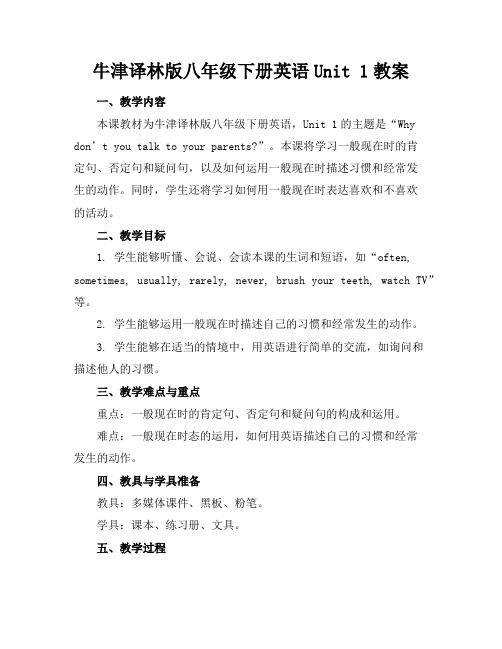
牛津译林版八年级下册英语Unit 1教案一、教学内容本课教材为牛津译林版八年级下册英语,Unit 1的主题是“Why don’t you talk to your parents?”。
本课将学习一般现在时的肯定句、否定句和疑问句,以及如何运用一般现在时描述习惯和经常发生的动作。
同时,学生还将学习如何用一般现在时表达喜欢和不喜欢的活动。
二、教学目标1. 学生能够听懂、会说、会读本课的生词和短语,如“often, sometimes, usually, rarely, never, brush your teeth, watch TV”等。
2. 学生能够运用一般现在时描述自己的习惯和经常发生的动作。
3. 学生能够在适当的情境中,用英语进行简单的交流,如询问和描述他人的习惯。
三、教学难点与重点重点:一般现在时的肯定句、否定句和疑问句的构成和运用。
难点:一般现在时态的运用,如何用英语描述自己的习惯和经常发生的动作。
四、教具与学具准备教具:多媒体课件、黑板、粉笔。
学具:课本、练习册、文具。
五、教学过程1. 情景引入:教师通过展示一幅图片,图片中有一个男孩在刷牙,一个女孩在看电视,引发学生对日常习惯的讨论。
2. 新课导入:教师引导学生学习一般现在时的肯定句、否定句和疑问句,并通过例句和练习让学生掌握一般现在时的构成和运用。
3. 课堂实践:教师设计一些情境,让学生运用一般现在时进行角色扮演和小组讨论,如描述自己的日常习惯,询问和描述他人的习惯等。
4. 随堂练习:教师给出一些练习题,让学生独立完成,检验学生对一般现在时的掌握程度。
六、板书设计板书内容:一般现在时肯定句:主语 + 动词原形否定句:主语 + don't/doesn't/does not + 动词原形疑问句:Do/Does/Doesn't + 主语 + 动词原形?七、作业设计1. 作业题目:用一般现在时描述你的日常习惯,并写一篇短文介绍你的朋友。
牛津译林版英语八下Unit 1《Past and Present》(Task)教学设计

牛津译林版英语八下Unit 1《Past and Present》(Task)教学设计一. 教材分析牛津译林版英语八下Unit 1《Past and Present》主要介绍了人们的生活在过去和现在是如何变化的。
通过对比过去和现在的生活,让学生学会使用过去时和现在时描述事物的变化。
本课时的Task部分主要让学生学会如何根据自己的需求选择合适的住房。
本节课的主要话题是房屋租赁和购买,学生需要掌握相关的词汇和句型,以及学会如何进行房屋租赁和购买的对话。
二. 学情分析学生在学习本节课之前,已经掌握了如何描述过去和现在的生活的语法知识,同时也具备了一定的房屋租赁和购买的相关词汇。
但是,学生对于如何在实际场景中运用这些知识和词汇进行对话还存在一定的困难。
因此,在教学过程中,教师需要帮助学生将这些知识和词汇应用到实际场景中,提高学生的实际语言运用能力。
三. 教学目标1.知识目标:–学生能够掌握并运用相关的词汇和句型描述房屋租赁和购买的情况。
–学生能够通过对比过去和现在的生活,学会使用过去时和现在时描述事物的变化。
2.能力目标:–学生能够在实际场景中运用所学的知识和词汇进行对话。
–学生能够提高自己的听、说、读、写的能力。
3.情感目标:–学生能够通过学习本节课,增强对英语学习的兴趣。
–学生能够学会如何根据自己的需求选择合适的住房。
四. 教学重难点•学生能够掌握并运用相关的词汇和句型描述房屋租赁和购买的情况。
•学生能够通过对比过去和现在的生活,学会使用过去时和现在时描述事物的变化。
•学生能够在实际场景中运用所学的知识和词汇进行对话。
•学生能够学会如何根据自己的需求选择合适的住房。
五. 教学方法1.情境教学法:通过设定真实的房屋租赁和购买的场景,让学生在实际情境中学习并运用所学的知识和词汇。
2.任务型教学法:通过完成具体的任务,让学生学会如何根据自己的需求选择合适的住房。
3.交际法:通过小组讨论和角色扮演等方式,让学生在课堂上进行真实的交际,提高学生的听、说、读、写的能力。
八年级英语下册 Unit1精品教学案(共10课时) 牛津译林版
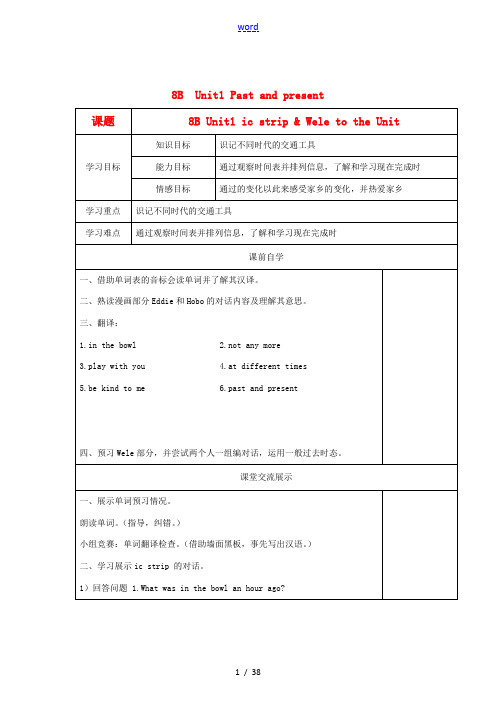
8B Unit1 Past and present8B Units1导学案参考答案Unit1第一课时:一、1.was 2.has eaten 3.to have 4.to play 5.is eating 6.took 7.rode8.will be二、1.would like , grows up 2.walks to school 3.goes to work by bus 4.flies to5.don’t want to any more第二课时:一、1.know about 2.get married 3.move out 4.water pollution 5.in the centreof6.feel lonely7.turn into8.from time to timeed to do 10.in some ways二、well has lived southern got married in the centre of children has changed a lotmarket stallsHas turned into to play cards pleasant shoe factory waste waterfish and plants polluted took action cleaner in some ways open space lonely第三课时:一、1. I don’t want to play with you any more.2.There used to be the home of birds.3.He live in Beijing since he moved here.4.In the past ,many people had no money to go to school.5.Nanjing has changed a lot in the past five years.6.Many friends have moved to other places ,so I feel lonely from time to time.7.I had an interview with my Chinese teacher this morning.8.It has bee more difficult to play chess with my old friends.二、1.Where have they gone ..2.How long has lived3.When was born4.you helping me第四课时:一、1.dishonest 2.unhappy 3.unlucky 4.impolite 5.unkind二、D C C B C A三、1.cheaper 2.healthiest 3.impossible 4.safely 5.well better第五课时:一、1.They haven’t read the book yet.Have they read the book yet? Yes, they have/ No , they haven’t1.How long has Daniel stayed in Shanghai?2. I have known him for ten years.3.Sandy has been in Beijing for half an hour.二、1. Have seen have did see2.lent hasn’t given 3.have been did visit第六课时:一、C C A A D B二、1. He has already finished homework.2.Have you ever been to Beijing?3.I have known Linda for 3years.4. I have just seen Lily.5.We haven’t heard from him for a long time.第七课时:一、1.is 2.do 3.will be 4.shall go 5.taught 6.has taught 7.has gone8.Have seen 9.have learned 10.will arrive二、1.How long have you known him?2.Has Jane finished her homework?3.I haven’t worked in this school for two years.4.Why hasn’t Jim finishedhis homework?5.when did you buy this watch?6.Who is the old man next to Lily?7.Which girl is my sister?8.How far is your home from your school?第八课时:一、1.advantages 2.reduce 3.changed 4.developments 5.service6.interview7.realizes 9.repair二、1.recently 2.unpleasant 3.impolite 4.have done 5.left6.southern7.polluted8.Has arrived arrived9.has eaten 10.have been第九课时:第十课时:一、1.as often as before 2. have an interview with sb ed to do sth 4.so big and modern5.in the north of二、1. was has lived 2.was made 3.Has arrived arrived 4.has eaten5.safely6.has been7.have been三、1.B 2.C 3.B 4.C 5.D 6.A四、1.Have you anything 2.doesn’t provide any longer 3.since ago ed to5.has been to。
牛津译林版八年级英语下册Unit1课件(共56张PPT)

用所给词的适当形式填空:
1. Drinking _p_o_ll_u_t_e_d_ water does harm to one’s health so watepro_ll_u_t_i_o_n__ is really terrible. (pollute)
2. Guang dong Province is in the s_o__u_t_h_e_r_npart of China.
5.改进,改善 improve (名词) improvement
6.形势,情况 situation
7.尽管,即使这样 anyway
8.环境,条件 condition
9.到(在)国外 abroad
10.正是,没错 exactly
11.小学教育的,初级的 primary
12.丈夫 husband
13.妻子 wife
(n.) communication
用所给词的适当形式填空:
1. We can learn a lot about Yangzhou’s Past and
_p_r_e_s__e_n_t____(现在).
2. I can’t imagine how terrible the _s_i_t_u_a_t__io__n(形势) was
(复数) wives
14.环境 environment(形容词) environmental
Part1 Words
1. 北方 north (adj.) northern
2.南方 south (adj.) southern 3.结婚(vt.) marry (adj.) married
(n.)marriage 4.污染 (vt.) pollute (adj.)polluted(n.)pollution 5.采访(vt.) interview (n.) interview (n.)interviewer 6.进来,最近 (adv.) recently (adj.) recent 7.交流,交际(vt.) communicate
2023年牛津译林版八年级英语下册Unit1 Grammar简案
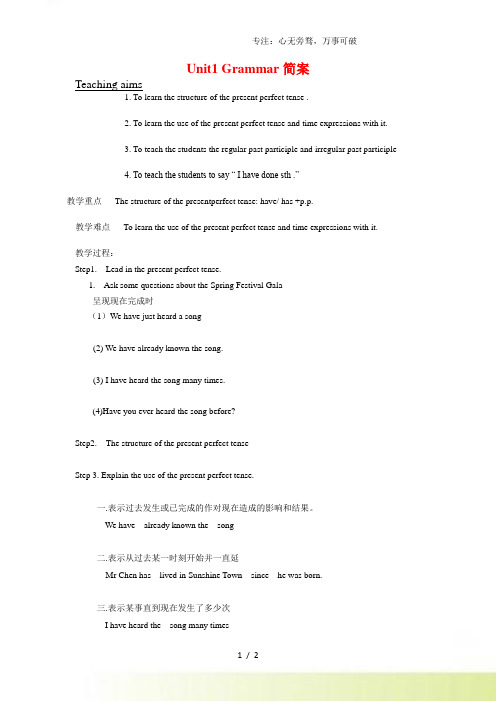
Unit1 Grammar简案Teaching aims1. To learn the structure of the present perfect tense .2. To learn the use of the present perfect tense and time expressions with it.3. To teach the students the regular past participle and irregular past participle4. To teach the students to say “ I have done sth .”教学重点The structure of the presentperfect tense: have/ has +p.p.教学难点To learn the use of the present perfect tense and time expressions with it.教学过程:Step1. Lead in the present perfect tense.1.Ask some questions about the Spring Festival Gala呈现现在完成时(1)We have just heard a song(2) We have already known the song.(3) I have heard the song many times.(4)Have you ever heard the song before?Step2. The structure of the present perfect tenseStep 3. Explain the use of the present perfect tense.一.表示过去发生或已完成的作对现在造成的影响和结果。
We have already known the song二.表示从过去某一时刻开始并一直延Mr Chen has lived in Sunshine Town since he was born.三.表示某事直到现在发生了多少次I have heard the song many timesPractice:CompleteP14,BStep4. Time expressions of the present perfect tense.Practice: Get the students to do some exercises and then CompleteP14,CStep 5. the regular past participle and irregular past participle规则动词:规则动词的过去分词的构成规则与规则动词的过去式的构成规则相同。
2022年牛津译林版八年级英语下册Unit 1 Past and present教案

Unit 1 Past and present教案总课题8B Unit 1 Past and present 总课时8 第1 课时课题Welcome to the unit 课型New教学目标1 To introduce the present perfect tense generally.2 To introduce the different forms of transport at different times in Hong Kong.教学重难点1.To introduce the present perfect tense generally.2 To introduce the different forms of transport at different times in Hong Kong.学法指导task-centered approach教具准备课件教学步骤二次备课Step 1: Free talkIn the past, Hobo and Eddie weregood friends. But now somethinghappens between them. Do you wantto know what’s wrong with them?Step 2: PresentationRead the dialogue, and find out the answers to the followingquestions.1)What was in the bowl an hour ago?2) What did Eddie do?3) Why did he do that thing?4) Why does Hobo think Eddie has changed?Explaining the new tense :the present perfect tenseEg: 1) Have you seen my food?(see—saw—seen)2)I’ve (I have) eaten it.(eat—ate—eaten)3) We have not seen him for a long time ……4) How has he changed?Let Ss read the dialogue in pairs.Step 3: Presentation1. Show the pictures . Discuss them with the Ss.: What’s the use ofit?Where do you usually see it?Is it a special one? Why?Which transport do you like best?2. Write the correct names under the pictures.Step 4: PracticeFinish part B (Back to the past) & complete the timeline.作业设计1.背诵本课的单词与词组2.预习Reading,完成预习作业教学反思总课题8B Unit 1 Past and present 总课时8 第2课时课题Reading 1 课型New 教学目标1 To grasp some useful expressions2 To infer general meaning from title and context教学重难点The unders tanding of the reading学法指导Task-centered approach教具准备课件教学步骤二次备课Step 1 Free talk .Where is your hometown?Has it changed a lot?Can you tell us something about the changes to your hometown?As you know, I am a teacher now. But five years ago, I was ateacher, too. So I have worked here for 3 years. I think our schoolchanged a lot. Do you think so? Everything has changed a lot?Step2: Presentation.Have you been to Beijing? Now, look at some pictures of it. Witnessgreat changes to it over 100 years. Show pictures.Step 3 Reading A1. Would you like to listen to Mr Chen, Daniel’s grandpa? Play theta pe for Ss 2 times. Answer the following questions.How long has Mr Chen known Sunshine Town?Did Mr Chen live there all the time? Why?Does Mr Chen think the place changed a lot?What are the differences between the past and present?2.Check the answers if they can not answer.3. Explain some difficul t points.4. Ask Ss to read in pairs and try to act it out.Step4: Practice.1.Do the exercise on page 10 B1Match the words on the left with the meanings on the right.2. Finish off the exercises of partB2,3 on P.(T/F).S tep 5 Finish Part D on page 11作业设计1.背诵本课的单词与词组2.完成《课课练》上本课时的作业教学反思总课题8B Unit 1 Past and present总课时8 第 3 课时课题Reading 2课型New教学目标To grasp some useful expressions and understand the new tense-Present perfect tense;To retell the main idea of the text;教学重难点To get more detailed information about the changes to the town and understand the new tense-Present perfect tense.学法指导Task-centered approach教具准备课件教学步骤二次备课Step 1: Pre-checking.Translate the phrasesAsk some students to give us the answers and then correct;Ask themto read together.B.预习交流作业(见学案)小组核对-----集体校对-----质疑交流C.Further understanding the text.Ask and answer.Who is Mr Chen?(He is Daniel's grandpa who lived in Sunshine Town before.)What do you know about Mr Chen?(He got married in 1965.Then he and his wife moved to another flat inthe center of town. Lase Last year, they moved again. Now, he oftenmeets his friends in the park.He feels a bit lonely from time to time.)What was in Sunshine Town in the past?(There was some small restaurants,shops and market stalls. There wasalso a small post office and an old cinema.)How many people lived there in the past?(30,000people.)What is the town centre now?(It's a park. )What does Mr Chen do in the park?(He meets his friends to play cardsand chinese Chinese chess.)Why is there less water pollution than before?(Because thegovernment has took taken action to reduce the pollution. )Step2:PresentationA. Present perfect tense:①概念:动词结构:have/has+动词的过去分词基本用法:表示这个动作发生在不确定的过去时间并对现在有影响。
- 1、下载文档前请自行甄别文档内容的完整性,平台不提供额外的编辑、内容补充、找答案等附加服务。
- 2、"仅部分预览"的文档,不可在线预览部分如存在完整性等问题,可反馈申请退款(可完整预览的文档不适用该条件!)。
- 3、如文档侵犯您的权益,请联系客服反馈,我们会尽快为您处理(人工客服工作时间:9:00-18:30)。
预习要求
To revise the article in reading
教学内容及活动设计
二次复备及教学随感
Step4Practice
Read the interview again and complete the exercises in Part B2
Step 5பைடு நூலகம்est
1. Fill in the blanks according to the interview.
2.完成【课课练】14页一、二大题
To talk about different kinds of traffic used in different times.
教 学
重难点
To learn about different kinds of traffic in different times inBeijing.(Importance)
课 题
8B Unit 1 Past and present
Welcome to the unit & comic strip
课时
8-1
授课时间
教学目标
To learn about different kinds of traffic in different times inBeijing.
To know about thepresent perfect tense.
板书设计
教后记
课 题
8B Unit 1 Past and present
Grammar 1
课时
8-4
授课时间
教学目标
Tolearn to use the past perfect tense to talk about things.
To grasp the difference between the simple past tense and the past perfect one.
To finish some exercises to grasp these language points further.(Difficulty)
预习要求
To revise the article inReading.
教学内容及活动设计
二次复备及教学随感
Step1 Checking
Do you remember who Mr Chen is ? Can you Complete the table about him?
1. Why does Mr Chen knowSunshineTownwell?
since he was born自从他出生以来
Since +短语(过去某一点时间)/句子(一般过去时)
2. Has he lived in the same house?
get married结婚
be/get married to Sb.和…结婚
Can you tell us some changes to your hometown?
Step3 Learning
1. Learn some new words with the help of some pictures .
2. Skimming
Read the article as quickly as they can and
Step 6 Learning
Read Part B and answer:
1.How did Millie’s dad go to school when he was a student?
2. Why didn’t Millie’s dad take a bus?
3.How does Millie go to school?
Tograsp the important vocabularyandsentences in the article.
To finish some exercises to grasp these language points further.
教 学
重难点
Tograsp the important vocabularyandsentences in the article.(Importance)
Answer the questions.
3. Scanning
1)Read the interview carefully (L1-L6),and answer two more questions.
2)Read L7-L16 carefully and fill in the table
3) Read L17-L23,and complete the sentences.
Can you say some more names of the transport?
Step 3 Learning
Learn more about the transport
Step 4 Practising
Finish Part A on Page 7
1.coach
2.bus
3.taxi
4.underground
lonely adj.孤独的,寂寞的(作表语或定语)
Step4Practice
Read the interview again and complete PartB3 and Part B4
Step5Test
Translate some phrases.
Step6 Homework
Finish off the exercises in the Exercise Book . Try to recite the text.
3.完成《课课练》
4.预习Reading
板书设计
教后记
课 题
8B Unit 1 Past and present
Reading1
课时
8-2
授课时间
教学目标
Tolearn about the changes inSunshineTown.
Tograsp the main idea of the article.
教学内容及活动设计
二次复备及教学随感
Step 1 Checking
Show some pictures and let the Ss say the names of the transport(交通工具)
Step 2 Lead–in
Ask: How do you go to school every day?
Tofeel the difference in the past and at the present inSunshineTown.
教 学
重难点
Tolearn about the changes inSunshineTown.(importance)
Tograsp the main idea of the article.(difficulty)
But you may not know how to use them correctly .
Today, let’s learn how to use them together.
Maybe you have more questions.
Step3 Learning
Learn language points by answering some questions.
A. am used to B. used to
C. use toD. using to
4.你看到我的英语书了吗?
5.你能告诉我北京在过去一百年中的变化吗?
6.在英语课上我过去常说汉语.
Step2 Lead—in
Have a free talk :
Where is your hometown?
Has your hometown changed a lot?
How are Eddie and Hobo now?
Have they changed?
Step 9 Learning
Read Comic strip and answer:
1.Where was Hobo’s food an hour ago?
2. Why did Eddie eat food?
4. Why does she take a bus?
Step 7 Practising
1.Read Part B aloud.
2. Make conversations to talk about transport.
Step 8 Lead-in
Transport has changed a lot over the years .
Mr Chen
How long he has lived in S T
Where he first lived
When he got married
Where he lives
Step2 Lead—in
Have a free talk :
Now, you can say something about Mr Chen with the help of the table.
5.train
6.plane
Step 5 Lead-in
1.Do you know how your dad went to school when he was a student?
2.Do you know how Millie’s dad went to school when he was a student?
